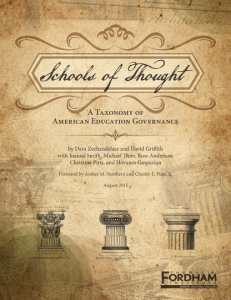 Florida is home to the most “consolidated” system of of education governance in the country, according to a new report from the Thomas B. Fordham Institute.
Florida is home to the most “consolidated” system of of education governance in the country, according to a new report from the Thomas B. Fordham Institute.
The report’s authors base this conclusion on the fact that Florida places much of its state decision-making authority in the Board of Education, and local power rests in the hands of a few, relatively large school districts.
The state’s laws and constitution don’t contemplate the creation of something like an Achievement School District or a Recovery School District — the kind of institution that might run or oversee some schools outside the purview of a traditionally defined district.
The Fordham report looks at the institutions that oversee the education systems in each state. It then tries to gauge whether they place more power at the state or local level, how much public participation they invite (based on factors like the extent to which people have a chance to elect education officials), and whether decision-making authority is concentrated in relatively few hands.
Florida is close to the middle of the road in the first two areas. Its appointed state education officials mean it’s slightly less likely to invite public participation, according to Fordham’s framework, than states that elect their state boards or education commissioners. And because school districts have the authority to do things like authorize charter schools and set teacher evaluation systems, it has more local control than many other states.
It’s in the area of consolidation where Florida stands out. In other states, districts are much smaller, which means power is distributed among more institutions. At the state level, meanwhile, one board sets most of the rules for Florida’s K-12 system, and has influence over higher education and early learning, too.
The full framework, based on other political philosophers, is illustrated in the graphic here and detailed in the report here.
Fordham’s researchers label Florida a “Platonist” state, citing a quote from the Greek philosopher: “There will be no end to the troubles of states, or of humanity itself, until philosophers become kings in this world, or until those we now call kings and rulers really and truly become philosophers.”
This analysis suggests local school boards in Florida hold more influence over more students than their counterparts many other states — an idea reinforced in the state constitution, which gives school board authority over “all free public schools” in their boundaries.
This is important context for the perennial push and pull between districts and Legislature on issues like charter school authorizing. Right now, some of the biggest checks on school boards’ authority come from above. Reasonable people can debate how much sense that makes, or whether districts should get more local autonomy, but it’s worth understanding how other states have dealt with these questions.


